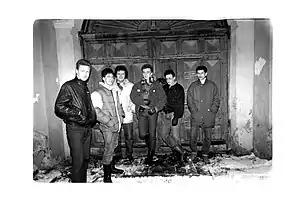FOJE | |
|---|---|
 Group picture of the Lithuanian rock band Foje, among the protagonists of the third edition of the Roko maršas (March). Vilnius, 1987. | |
| Background information | |
| Origin | Vilnius, Lithuania |
| Genres | Alternative rock, new wave |
| Years active | 1983–1997, 2013 |
| Labels |
|
| Past members |
|
| Website | www |
Foje was one of the most successful and best known rock bands in Lithuania.
History
Foje was formed in the present-day Antakalnis Secondary School in Vilnius by Andrius Mamontovas, Arnoldas Lukošius and Darius Tarasevičius in 1983 under the name of Sunki Muzika ("Hard Music"), few months later Algis Kriščiūnas joined the band. In 1984 it was renamed to Foje (literal meaning: "foyer"). Through its years, the band survived a number of lineup changes, and released over 10 albums.
The group cited several influences, including the sound of the Stranglers, as well as the 1980s post-punk movement (for example the notable nod to Depeche Mode on Foje's 1989 electronica album Žodžiai į Tylą). These influences were combined with the often gloomy, desperate lyrics of the band's leader Andrius Mamontovas.
In 1997 the band performed three farewell gigs in the Lithuanian cities of Klaipėda, Kaunas and Vilnius, with attendance of 60,000 in the final performance on 17 May in Vingis Park of Vilnius.[1] After disbanding Mamontovas started a solo career.
Two of the band's songs - "Laužo šviesa" ("The Light of the Bonfire") (1986) and "Meilės nebus per daug" ("There will not be too much love") (1994) - were voted by the media professionals into the Top 20 best Lithuanian songs of the 20th century in 2000.[2]
Members
- Andrius Mamontovas (1983–1997) - Vocals, guitar, drums, keyboards
- Arnoldas Lukošius (1983–1989, 1992–1997) - Keyboards, accordion
- Algis Kriščiūnas (1983–1985, 1992–1997) - Drums
- Darius Burokas (1986–1988, 1990–1997) - Bass, keyboards
- Darius Tarasevičius (1983–1985) - Bass
- Romas Rainys (1985–1988) Bass, Guitar
- Eugenijus Pugačiukas (1985–1991) - Drums
- Saulius Valikonis (1986–1988, 1989–1991) - Saxophone
- Gediminas Simniškis (1988–1989) - Bass
- Jaunius Beinortas (1988–1989) - Guitar
- Robertas Meržvinskas (1988–1989) - Saxophone
- Robertas Griškevičius (1989–1990) - Keyboards
Discography
- 1989 - Geltoni krantai (Yellow Shores) (MC)
- 1990 - Žodžiai į tylą (Words Into Silence) (LP, MC[note 1])
- 1991 - Gali skambėti keistai (It Might Sound Strange) (LP, CD,[note 1] MC[note 1])
- 1992 - Kitoks pasaulis (A Different World) (LP, CD,[note 2] MC[note 2]) - first CD album in Lithuanian music history.
- 1993 - Vandenyje (In The Water) (LP, CD, MC)
- 1994 - Tikras garsas (The Real Sound) (MC)
- 1994 - M-1 (dancemixes) (CD, MC)
- 1994 - Aš čia esu (I Am Here) (MC)
- 1994 - Aš čia esu (LP Picture Disc)
- 1995 - Kai perplauksi upę (When You Swim Across The River) (CD, MC)
- 1995 - Live On The Air (MC)
- 1996 - 1982 (MC, CD)
- 1997 - The Flowing River EP (CD)
- 1997 - Mokykla (School) (MC)
- 1999 - Vilnius - Kaunas - Klaipėda (CD, MC)
- 2002 - Paveikslas (The Picture) (CD, MC)
- 2006 - Kita paveikslo pusė (The Other Side of the Picture) (CD)
- 2013 - AM+FOJE=30 (AM - Andrius Mamontovas) (CD)
References
- ↑ "Foje official website". Archived from the original on 2021-02-01. Retrieved 2006-12-04.
- ↑ "Radiocentras" išdalino apdovanojimus, by Baltic News Service
External links
- Foje official website Archived 2021-05-14 at the Wayback Machine